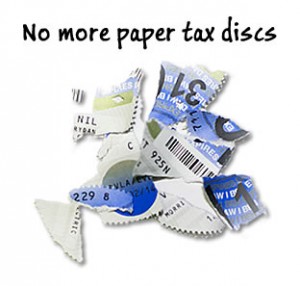Vehicles registered in the UK that are used or parked on public roads must be taxed. Prior to 1 October 2014, the Driver and Vehicle Licensing Agency (DVLA) issued road tax discs.
Road tax still needs to be purchased via the DVLA, though the paper tax disc has been abolished and as a result, no longer required to be displayed in the vehicles windscreen. Instead of physically checking the tax disc, police now use Automatic Number Plate Recognition (ANPR) in their vehicles.
The ANPR system exchanges data with the DVLA database which keeps a record of all taxed and untaxed vehicles.
You are not required to tax a vehicle if you are not driving or parking it on a public highway. If kept off road, a vehicle must be declared SORN (Statutory Off Road Notification). If a vehicle isn’t declared SORN, you are still required to tax the vehicle. SORN lasts for 12 months and must be applied for again when expired.
In order to tax a vehicle, suitable insurance cover must be provided plus a valid MOT must be in place if applicable. An MOT certificate is required for cars that are more than 3 years of age.

Penalty for driving without tax
The DVLA maintain a computer database of all vehicles registered in the UK. Database checks are made on a monthly basis and among other things, this database informs them of which vehicles have current tax along with those that don’t. If the system flags a vehicle as being untaxed and not declared SORN, an automated letter and fine of £80 will be issued to the registered keepers address. Early settlement of this fine if paid within 28 days can see a 50% discount where you will be required to pay a fine of £40.
Failure to settle the fine will result in prosecution where the court may increase the fine to a maximum of £1000 depending on the circumstances (this usually includes any tax arrears owed), plus offenders will be faced with paying court costs.
Vehicle clamped for no tax
The DVLA also have the power to clamp vehicles. If your vehicle is clamped, either a release fee of £100 must be paid or a valid tax must be purchased within 24 hours. Failure to purchase tax results in the owner having to produce a surety deposit of £160 for cars and motorcycles, this increases up to £700 for other vehicles. If tax disc is purchased within 2 weeks, the surety deposit is refunded. If tax is not purchased, the deposit will be lost and the vehicle may be re-clamped or impounded.
Impounded vehicles
A fee of £200 must be paid to release impounded vehicles, plus £21 per day storage costs. On top of clamping fees or impound fees, prosecution costs and fines may apply.
Caught with no road tax
If your vehicle is found to have no tax, an officer may issue you a Fixed Penalty Notice (FPN). If there is not valid tax for the vehicle determined by the officer contacting the DVLA, the officer has the power to seize the vehicle and have it impounded.
Is car insurance valid without road tax?
Generally speaking, if a car is driven without any valid road tax, car insurers are still obliged to honour and pay for any claims made for the vehicle. Although driving without tax is an offence, it is irrelevant in most cases to what is stated as being a prerequisite for insurance cover.
Car insurance contracts stipulate that a vehicle must be in a roadworthy condition and as such, driving without tax, which is a Vehicle Excise Duty bears no relevance to the roadworthiness of a vehicle.
In the event of an accident however, a car insurance provider may use whatever means they have to avoid paying for a claim. In such cases, the contract clause will not usually state such terms directly and advice should be sought from a legal representative.
Driving without tax penalty points
Penalty points are not issued if you are caught driving without tax or your vehicle is parked on a public highway.
Driving vehicle while SORN
Driving a car whilst declared SORN is much more serious offence than simply driving without tax. The fine and penalty depends on individual circumstances and the ultimate outcome is decided by the court. The maximum fine for this offence is £5,000 and a possibility of imprisonment.
Along with the higher penalties of driving a car while SORN, it will likely result in your car being seized from the roadside and impounded, where the same costs as above (driving or keeping a car on a public road without tax) will apply.
Can I drive without tax?
You are legally entitled to drive a car on a public road if going to a pre-booked MOT test. Disabled drivers may also be exempt from vehicle tax and certain vehicles are exempt. Further information for who is exempt from paying vehicle tax and which vehicles can be found here.
Road Tax 5 Day Grace Period
Prior to 1 October 2014 when paper tax discs were issued, a 5 day grace period was permitted if you had ordered your new tax online before your old tax has expired to allow time for its arrival in the post. With the introduction of the new digital system however, this rule no longer applies as there is no need to display tax in your windscreen.
INFORMATION RELATED TO DRIVING OFFENCES
- Driving offences
- Driving without insurance
- Driving without a licence
- Driving without an MOT
- Running a red light
- Driving without a wing mirror
You seem to be forgetting one thing a V5C form is a contract, Resisting your property with DVLA you become the registered keeper, you enter that contract, Deregister and be come the owner of that property take DVLA to Court if DVLA ignores your request its you final goods, not theirs look up consumer rights act.